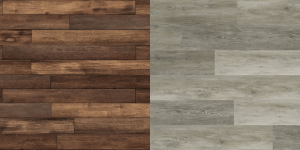28 Sep Vinyl Flooring Vs. Timber Flooring: Pro’s & Cons
Posted at 07:01h
in Uncategorized
When it comes to flooring options, two of the most popular choices among homeowners are vinyl and timber flooring. Both have their unique qualities and offer distinct advantages, but which is the right choice for you? To help you decide, we’ll break down the pros and cons of each type of flooring.

Image Source: Residence Style
Durability: What Lasts Longer?
Vinyl Flooring
- Water Resistance: Vinyl is a top choice for areas that are prone to water exposure like bathrooms and kitchens. It doesn’t swell or get damaged when it comes into contact with moisture.
- Scratch Resistance: This type of flooring is relatively scratch-resistant, making it a good fit for homes with pets.
- Maintenance: Keeping vinyl flooring clean is a breeze. All you need is a mop and a mild cleaner.
Timber Flooring
- Longevity: Timber floors can last for decades if they’re well maintained.
- Scratch Prone: Unlike vinyl, timber floors can get scratched easily, but the scratches can be sanded away.
- Sensitive to Moisture: Wood tends to swell and contract with humidity, which may lead to warping over time.
Aesthetic Appeal: What Looks Better?
Vinyl Flooring
- Variety: Vinyl comes in an array of designs and colours, even mimicking the look of natural wood or stone.
- Consistency: Each vinyl plank looks identical, offering a uniform look across your floor.
Timber Flooring
- Natural Beauty: Timber floors add a warm and natural element to your home.
- Customisation: You can choose from different types of wood, stains, and finishes, making your floor one-of-a-kind.
Installation: Which is Easier to Install?
Vinyl Flooring
- DIY-Friendly: Most vinyl flooring options come with an easy click-lock system that makes DIY installation possible.
- Quick Turnaround: Installation is generally quicker than with timber, as it often doesn’t require any adhesives or nails.
Timber Flooring
- Professional Installation: It’s advisable to get professionals to install your timber flooring for a seamless finish.
- Time-Consuming: The process can be lengthy, especially if the timber needs acclimatising or if subfloor preparation is required.
Cost: Which is More Budget-Friendly?
Vinyl Flooring
- Affordable: Among the most cost-effective flooring options out there.
- Low Maintenance Costs: Basic cleaning supplies are often enough for maintenance, which keeps ongoing costs low.
Timber Flooring
- Higher Initial Cost: Timber flooring is generally more expensive to purchase and install.
- Maintenance Costs: You may need to invest in special cleaners or periodic refinishing.
Comfort and Insulation: How do They Feel?
Vinyl Flooring
- Softer Underfoot: Vinyl often feels softer, making it comfortable to walk on.
- Less Insulation: Vinyl doesn’t offer as much insulation as timber, so you might find your feet getting a bit colder in winter.
Timber Flooring
- Solid Feel: Timber offers a solid, sturdy feel underfoot.
- Good Insulation: Timber has natural insulating properties, keeping your home warm in winter and cool in summer.
Environmental Considerations: What’s the Green Choice?
Vinyl Flooring
- Less Sustainable: Itis made from synthetic materials and is not biodegradable.
- Recycling Challenges: Not all types of vinyl flooring are recyclable.
Timber Flooring
- Sustainable Options: Many timber floors come from sustainable sources.
- Biodegradable: Timber is a natural material that can decompose, reducing its environmental impact.
Final Thoughts
Both vinyl and timber flooring have their merits and drawbacks. If you’re after durability and a budget-friendly option, vinyl flooring might be the way to go. On the other hand, if you’re looking for a timeless, natural aesthetic and are willing to invest in maintenance, timber flooring could be your best bet. Consider your lifestyle, aesthetic preferences, and budget to make an informed decision.



